.
1776 Jul 4 United States Declaration of Independence
1776 Aug 27 Battle of Long Island
1776 Sep 15 British Occupation of New York
1776 Sep 15 Landing At Kip's Bay
1776 Sep 16 Battle of Harlem Heights
1776 Oct 11 Battle of Valcour Island
1776 Oct 18 Battle of Pell's Point
1776 Oct 28 Battle Of White Plains
1776 Nov 10 to 1776 Nov 29 Battle Of Fort Cumberland
1776 Nov 16 Battle of Fort Washington
1776 Nov 19 Battle Of Fort Lee
1776 Dec 14 Ambush of Geary
1776 Dec 23 to 1776 Dec 26 Battle of Iron Works Hill
1776 Dec 26 Battle of Trenton
1776 Dec 26 Washington Crosses the Delaware
1777 Forage War
1777 to 1778 Philadelphia Campaign
1777 Jan 2 Battle Of The Assunpink Creek
1777 Jan 3 Battle of Princeton
1777 Jan 20 Battle Of Millstone
1777 Apr 13 Battle Of Bound Brook
1777 Apr 27 Battle of Ridgefield
1777 May 17 Battle Of Thomas Creek
1777 May 23 Meigs Raid
1777 Jun 14 to 1777 Oct 17 Saratoga Campaign
1777 Jun 26 Battle Of Short Hills
1777 Jul 2 to 1777 Jul 6 Battle of Ticonderoga
1777 Jul 7 Battle Of Hubbardton
1777 Jul 8 Battle Of Fort Anne
1777 Aug 2 to 1777 Aug 22 Siege Of Fort Stanwix
1777 Aug 6 Battle of Oriskany
1777 Aug 16 Battle of Bennington
1777 Aug 22 Battle Of Staten Island
1777 Sep 11 Battle of Brandywine
1777 Sep 16 Battle of the Clouds
1777 Sep 19 Battle of Saratoga
1777 Sep 21 Battle of Paoli
1777 Oct 4 Battle of Germantown
1777 Oct 6 Battle Of Forts Clinton And Montgomery
1777 Oct 22 Battle of Red Bank
1777 Nov 25 Battle Of Gloucester
1777 Dec 5 to 1777 Dec 8 Battle of White Marsh
1777 Dec 11 Battle Of Matson's Ford
1777 Dec 19 to 1778 Jun 19 1778 France declares war on Britain in support of the American colonies
1778 to 1782 Naval Operations In The American Revolutionary War
1778 Mar 18 Battle Of Quinton's Bridge
1778 Apr 19 Frederica Naval Action
1778 Apr 24 North Channel Naval Duel
1778 May 1 Battle Of Crooked Billet
1778 May 20 Battle of Barren Hill
1778 May 25 Battle Of Freetown
1778 May 30 Battle of Cobleskill
1778 Jun 28 Battle of Monmouth
1778 Jun 30 Battle of Alligator Bridge
1778 Jul to 1779 Feb Illinois campaign
1778 Jul 3 Battle Of Wyoming
.
1778 Jul 24 to 1779 Aug 12 Penobscot Expedition
1778 Jul 27 Battle Of Ushant
1778 Aug 21 to 1778 Oct 19 Siege Of Pondicherry
1778 Aug 29 Battle Of Rhode Island
1778 Sep 7 to 1778 Sep 18 Siege of Boonesborough
1778 Sep 17 Attack on German Flatts
1778 Sep 27 Baylor Massacre
1778 Oct Little Egg Harbor Massacre
1778 Oct 15 Battle of Chestnut Neck
1778 Nov 11 Cherry Valley Massacre
1778 Dec 15 Battle of St. Lucia
1778 Dec 29 Capture Of Savannah
1779 Feb 3 Battle Of Beaufort
1779 Feb 14 Battle of Kettle Creek
1779 Feb 25 George Rogers Clark Accepts Henry Hamilton's Surrender Of Fort
Sackville At Vincennes, Indiana
1779 Mar 3 Battle of Brier Creek
1779 Jun 20 Battle of Stono Ferry
1779 Jun 24 to 1783 Feb 7 Great Siege of Gibraltar
1779 Jul 6 Battle of Grenada
1779 Jul 16 Battle of Stony Point
1779 Jul 19 to 1779 Jul 22 Battle of Minisink
1779 Jul 24 to 1779 Aug 12 Penobscot Expedition
1779 Aug 19 Battle of Paulus Hook
1779 Sep 13 Boyd and Parker Ambush
1779 Sep 16 to 1779 Oct 18 Siege of Savannah
1779 Sep 23 Battle Of Flamborough Head
1779 Oct 16 to 1779 Nov 29 Battle Of San Fernando De Omoa
1779 Sep 16 to 1779 Oct 18 Siege of Savannah
1781 May 22 to 1781 Jun 19 Siege Of Ninety-Six
1781 Jun 26 Battle of Spencer's Ordinary
1781 Jul Francisco's Fight
1781 Jul 6 Battle of Green Spring
.
1781 Aug 19 to 1782 Feb 5 Invasion of Minorca
1781 Aug 24 Lochry's Defeat
1781 Sep 5 Battle of the Chesapeake
1781 Sep 6 Battle of Fort Griswold
1781 Sep 6 Battle Of Groton Heights
1781 Sep 8 Battle of Eutaw Springs
1781 Sep 13 Battle Of Lindley's Mill
1781 Sep 28 to 1781 Oct 19 Battle of Yorktown
1781 Oct 21 to 1781 Nov 11 Siege of Negapatam
1781 Oct 25 Battle Of Johnstown
1781 Dec 12 Battle Of Ushant
1782 Jan 11 Capture of Trincomalee
1782 Jan 25 to 1782 Jan 26 Battle of St. Kitts
1782 Feb 17 Battle Of Sadras
1782 Mar 16 Battle of Roatán
1782 Mar 20 Lord North Resigns as British Prime Minister
1782 Apr 9 to 1782 Apr 12 Battle of the Saintes
1782 Apr 12 Battle Of Providien
1782 Jul 6 Battle Of Negapatam
1782 Jul 11 British Evacuate Savannah, GA
1782 Aug 8 Battle Of Piqua
1782 Aug 19 Battle of Blue Licks
1782 Aug 25 to 1782 Sep 3 Battle of Trincomalee
1782 Aug 26 Battle Of The Combahee River
1782 Oct 20 Battle of Cape Spartel
1782 Nov 30 Preliminary Articles of Peace Signed
1783 Apr 15 Congress Ratifies Peace With Great Britain
1783 Apr 15 Revolutionary War Ends
1783 Jun 20 Battle Of Cuddalore
1783 Sep 3 Treaty of Paris
1783 Nov 25 British Evacuate New York
1783 Dec 23 Washington Resigns as Commander
1784 May 12 Treaty Of Paris Ratification Documents Are Exchanged
1787 Sep 17 U.S. Constitution Ratified
1791 Dec 15 United States Bill Of Rights Is Ratified
.
1776 Jul 4 United States Declaration of Independence
1776 Aug 27 Battle of Long Island
1776 Sep 15 British Occupation of New York
1776 Sep 15 Landing At Kip's Bay
1776 Sep 16 Battle of Harlem Heights
1776 Oct 11 Battle of Valcour Island
1776 Oct 18 Battle of Pell's Point
1776 Oct 28 Battle Of White Plains
1776 Nov 10 to 1776 Nov 29 Battle Of Fort Cumberland
1776 Nov 16 Battle of Fort Washington
1776 Nov 19 Battle Of Fort Lee
1776 Dec 14 Ambush of Geary
1776 Dec 23 to 1776 Dec 26 Battle of Iron Works Hill
1776 Dec 26 Battle of Trenton
1776 Dec 26 Washington Crosses the Delaware
1777 Forage War
1777 to 1778 Philadelphia Campaign
1777 Jan 2 Battle Of The Assunpink Creek
1777 Jan 3 Battle of Princeton
1777 Jan 20 Battle Of Millstone
1777 Apr 13 Battle Of Bound Brook
1777 Apr 27 Battle of Ridgefield
1777 May 17 Battle Of Thomas Creek
1777 May 23 Meigs Raid
1777 Jun 14 to 1777 Oct 17 Saratoga Campaign
1777 Jun 26 Battle Of Short Hills
1777 Jul 2 to 1777 Jul 6 Battle of Ticonderoga
1777 Jul 7 Battle Of Hubbardton
1777 Jul 8 Battle Of Fort Anne
1777 Aug 2 to 1777 Aug 22 Siege Of Fort Stanwix
1777 Aug 6 Battle of Oriskany
1777 Aug 16 Battle of Bennington
1777 Aug 22 Battle Of Staten Island
1777 Sep 11 Battle of Brandywine
1777 Sep 16 Battle of the Clouds
1777 Sep 19 Battle of Saratoga
1777 Sep 21 Battle of Paoli
1777 Oct 4 Battle of Germantown
1777 Oct 6 Battle Of Forts Clinton And Montgomery
1777 Oct 22 Battle of Red Bank
1777 Nov 25 Battle Of Gloucester
1777 Dec 5 to 1777 Dec 8 Battle of White Marsh
1777 Dec 11 Battle Of Matson's Ford
1777 Dec 19 to 1778 Jun 19 1778 France declares war on Britain in support of the American colonies
1778 to 1782 Naval Operations In The American Revolutionary War
1778 Mar 18 Battle Of Quinton's Bridge
1778 Apr 19 Frederica Naval Action
1778 Apr 24 North Channel Naval Duel
1778 May 1 Battle Of Crooked Billet
1778 May 20 Battle of Barren Hill
1778 May 25 Battle Of Freetown
1778 May 30 Battle of Cobleskill
1778 Jun 28 Battle of Monmouth
1778 Jun 30 Battle of Alligator Bridge
1778 Jul to 1779 Feb Illinois campaign
1778 Jul 3 Battle Of Wyoming
.
1778 Jul 24 to 1779 Aug 12 Penobscot Expedition
1778 Jul 27 Battle Of Ushant
1778 Aug 21 to 1778 Oct 19 Siege Of Pondicherry
1778 Aug 29 Battle Of Rhode Island
1778 Sep 7 to 1778 Sep 18 Siege of Boonesborough
1778 Sep 17 Attack on German Flatts
1778 Sep 27 Baylor Massacre
1778 Oct Little Egg Harbor Massacre
1778 Oct 15 Battle of Chestnut Neck
1778 Nov 11 Cherry Valley Massacre
1778 Dec 15 Battle of St. Lucia
1778 Dec 29 Capture Of Savannah
1779 Feb 3 Battle Of Beaufort
1779 Feb 14 Battle of Kettle Creek
1779 Feb 25 George Rogers Clark Accepts Henry Hamilton's Surrender Of Fort
Sackville At Vincennes, Indiana
1779 Mar 3 Battle of Brier Creek
1779 Jun 20 Battle of Stono Ferry
1779 Jun 24 to 1783 Feb 7 Great Siege of Gibraltar
1779 Jul 6 Battle of Grenada
1779 Jul 16 Battle of Stony Point
1779 Jul 19 to 1779 Jul 22 Battle of Minisink
1779 Jul 24 to 1779 Aug 12 Penobscot Expedition
1779 Aug 19 Battle of Paulus Hook
1779 Sep 13 Boyd and Parker Ambush
1779 Sep 16 to 1779 Oct 18 Siege of Savannah
1779 Sep 23 Battle Of Flamborough Head
1779 Oct 16 to 1779 Nov 29 Battle Of San Fernando De Omoa
1779 Sep 16 to 1779 Oct 18 Siege of Savannah
1781 May 22 to 1781 Jun 19 Siege Of Ninety-Six
1781 Jun 26 Battle of Spencer's Ordinary
1781 Jul Francisco's Fight
1781 Jul 6 Battle of Green Spring
.
1781 Aug 19 to 1782 Feb 5 Invasion of Minorca
1781 Aug 24 Lochry's Defeat
1781 Sep 5 Battle of the Chesapeake
1781 Sep 6 Battle of Fort Griswold
1781 Sep 6 Battle Of Groton Heights
1781 Sep 8 Battle of Eutaw Springs
1781 Sep 13 Battle Of Lindley's Mill
1781 Sep 28 to 1781 Oct 19 Battle of Yorktown
1781 Oct 21 to 1781 Nov 11 Siege of Negapatam
1781 Oct 25 Battle Of Johnstown
1781 Dec 12 Battle Of Ushant
1782 Jan 11 Capture of Trincomalee
1782 Jan 25 to 1782 Jan 26 Battle of St. Kitts
1782 Feb 17 Battle Of Sadras
1782 Mar 16 Battle of Roatán
1782 Mar 20 Lord North Resigns as British Prime Minister
1782 Apr 9 to 1782 Apr 12 Battle of the Saintes
1782 Apr 12 Battle Of Providien
1782 Jul 6 Battle Of Negapatam
1782 Jul 11 British Evacuate Savannah, GA
1782 Aug 8 Battle Of Piqua
1782 Aug 19 Battle of Blue Licks
1782 Aug 25 to 1782 Sep 3 Battle of Trincomalee
1782 Aug 26 Battle Of The Combahee River
1782 Oct 20 Battle of Cape Spartel
1782 Nov 30 Preliminary Articles of Peace Signed
1783 Apr 15 Congress Ratifies Peace With Great Britain
1783 Apr 15 Revolutionary War Ends
1783 Jun 20 Battle Of Cuddalore
1783 Sep 3 Treaty of Paris
1783 Nov 25 British Evacuate New York
1783 Dec 23 Washington Resigns as Commander
1784 May 12 Treaty Of Paris Ratification Documents Are Exchanged
1787 Sep 17 U.S. Constitution Ratified
1791 Dec 15 United States Bill Of Rights Is Ratified
.













































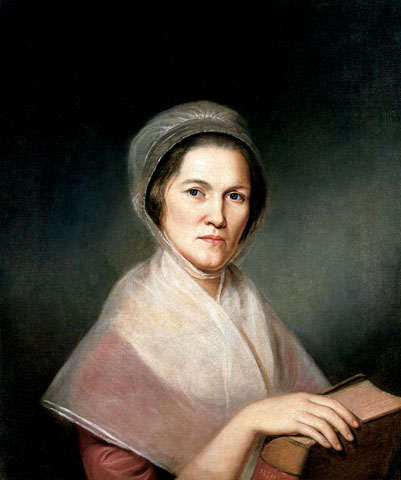





















+Young+Benjamin+Franklin+(1706-1790)+c.+1746.jpg)
+by+Revolutionary+War+hero+Tadeusz+Kosciuszko+(1746-1817).jpg)
+Catharine+Littlefield+Greene+Miller+b.jpg)
+Nathanael+Greene+(1742-1786)+1783.jpg)




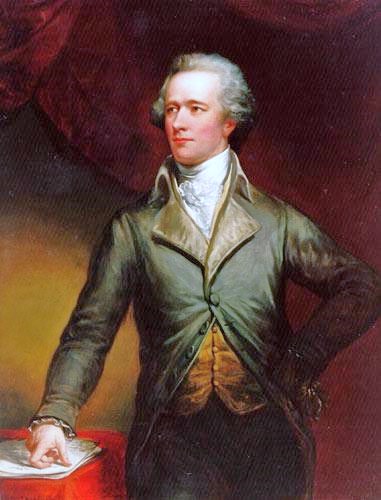
.+Mrs.+Alexander+Hamilton.+Elizabeth+Schuyler.jpg)
+and+Aaron+Burr+(1756-1836)+Duel+in+Weehawken,+New+Jersey..jpg)
+1802.jpg)

+(1601-1673)+Child+and+Sheep,+1655.jpg) Anthonie Palamedesz. (Stevaerts, Stevens) (1601-1673) Child and Sheep, 1655
Anthonie Palamedesz. (Stevaerts, Stevens) (1601-1673) Child and Sheep, 1655+Lady+Belasyse.jpg)
++Girl+with+a+Lamb+(2).jpg)
+Self+Portrait.jpg)
+Portrait+of+a+Woman+as+St+Agnes+traditionally+identified+as+Catherine+Voss.jpg)
+Portrait+of+Henrietta+Duchess+of+Bolton.jpg)
+De+Peyster+Girl+with+Lamb.jpg)
+Portrait+Of+Franks+Children+with+Lamb+1735.jpg)
+Mary+Sylvester.jpg)
+Elizabeth+and+Mary+Chichester.jpg)
+Girl+with+a+Lamb.jpg)
++Mary+Beekman.jpg)
++Miss+Frances+Warren.jpg)
+Miss+Frances+Warren.jpg)
.jpg)
++Baptist+Noel+4th+Earl+of+Gainsborough+and+His+Wife+Elizabeth+with+their+Children.jpg)
.+Rebecca+Orne+(later+Mrs.+Joseph+Cabot).+Worcester+Museum+of++Art..jpg)
+pvt1st-gallery-art.com.jpg) 1765 John Singleton Copley (1738-1815). Frances Deering Wentworth (Mrs. Theodore Atkinson, Jr.)
1765 John Singleton Copley (1738-1815). Frances Deering Wentworth (Mrs. Theodore Atkinson, Jr.) 1760s William Williams (1727-1791). Deborah Hall. Detail
1760s William Williams (1727-1791). Deborah Hall. Detail .+Girl+with+a+Squirrel..jpg)
 1790 Denison Limner Probably Joseph Steward (1753-1822). Miss Denison of Stonington, Connecticut possibly Matilda.
1790 Denison Limner Probably Joseph Steward (1753-1822). Miss Denison of Stonington, Connecticut possibly Matilda. 1798 Ralph Earl (1751-1801). Elizabeth Eliot (Mrs. Gershom Burr)
1798 Ralph Earl (1751-1801). Elizabeth Eliot (Mrs. Gershom Burr) Joseph Badger (1708-1765). Portrait of Two Children. 1760
Joseph Badger (1708-1765). Portrait of Two Children. 1760

 1745 American Painting - Joseph Badger (1708-1765). Detail of John Gerry (1741-1786) brother of Elbridge Gerry of Boston with bird.
1745 American Painting - Joseph Badger (1708-1765). Detail of John Gerry (1741-1786) brother of Elbridge Gerry of Boston with bird.



.jpg) 1755 American Painting - John Wollaston (1710-1775). Detail Elizabeth Page & Mann Page, children of Mann & Ann Corbin (Tayloe) Page of Rosewell, Gloucester County, with bird.
1755 American Painting - John Wollaston (1710-1775). Detail Elizabeth Page & Mann Page, children of Mann & Ann Corbin (Tayloe) Page of Rosewell, Gloucester County, with bird.

 1758 American Painting - John Singleton Copley (1738-1815). Detail Thomas Aston Coffin with two birds.
1758 American Painting - John Singleton Copley (1738-1815). Detail Thomas Aston Coffin with two birds. American Painting 1760 Joseph Badger (1708-1765). James Badger with bird.
American Painting 1760 Joseph Badger (1708-1765). James Badger with bird. American Painting 1760 Joseph Badger (1708 - 1765). Detail of Jemima Flucker with bird.
American Painting 1760 Joseph Badger (1708 - 1765). Detail of Jemima Flucker with bird.+Phil+Acad+of+Fine+Arts+2.jpg) American Painting 1763-65 Henry Benbridge (1743-1812). Detail of Gordon Family with bird.
American Painting 1763-65 Henry Benbridge (1743-1812). Detail of Gordon Family with bird.
.jpg)
















_+Jerusha+Benedict+(Ives)_.jpg)

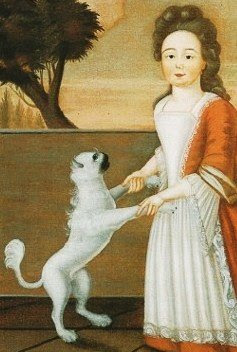 1710s Justus Engelhardt Kuhn (fl 1707-1717) Young Girl
1710s Justus Engelhardt Kuhn (fl 1707-1717) Young Girl 1715 Attributed to Charles Bridges (1670-1747). Child of Rev. Richard Chase (1692-1742) of London and Maryland, and his wife Margaret Frances Townley (d. 1741)
1715 Attributed to Charles Bridges (1670-1747). Child of Rev. Richard Chase (1692-1742) of London and Maryland, and his wife Margaret Frances Townley (d. 1741)
 1730s Child of the Pierpont Family.
1730s Child of the Pierpont Family. c. 1735 Charles Bridges (1670-1747). Anne Byrd.
c. 1735 Charles Bridges (1670-1747). Anne Byrd. 1720s-30s Gerardus Duyckinck (1695-1746). Jacomina Winkler
1720s-30s Gerardus Duyckinck (1695-1746). Jacomina Winkler 1755 John Singleton Copley (1738-1815). The Gore Children.
1755 John Singleton Copley (1738-1815). The Gore Children.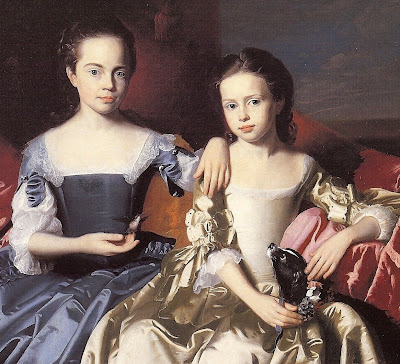 1758 John Singleton Copley (1738-1815). Mary MacIntosh Royall and Elizabeth Royall.
1758 John Singleton Copley (1738-1815). Mary MacIntosh Royall and Elizabeth Royall.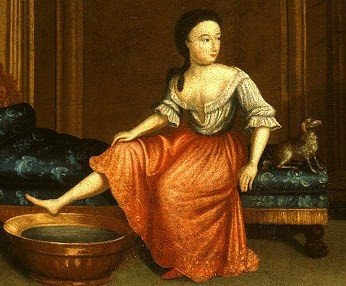 1730s Gerardus Duyckinck (1695-1746). Lady Undressing for a Bath.
1730s Gerardus Duyckinck (1695-1746). Lady Undressing for a Bath. 1730 John Simbert (1688-1751). Mrs Nathaniel Cunningham.
1730 John Simbert (1688-1751). Mrs Nathaniel Cunningham.+Magdalen+Charlton+(Mrs.+Thomas+Dongan).+Museum+of+Fine+Arts,+Boston.jpg) C 1750 John Wollaston (1710-1775) Magdalen Charlton (Mrs. Thomas Dongan).
C 1750 John Wollaston (1710-1775) Magdalen Charlton (Mrs. Thomas Dongan)..+Anne+Allen+(Mrs.+John+Penn)..jpg) c 1760 Benjamin West (1738-1820). Anne Allen (later Mrs. John Penn). John Penn (1729-1795) was the last governor of colonial Pennsylvania, serving from 1763-1771 & 1773-1776, & he was a grandson of William Penn. Portrait of the daughter of West's benefactor Chief Justice William Allen may have been painted as West was traveling from Pennsylvania to Italy and then to England.
c 1760 Benjamin West (1738-1820). Anne Allen (later Mrs. John Penn). John Penn (1729-1795) was the last governor of colonial Pennsylvania, serving from 1763-1771 & 1773-1776, & he was a grandson of William Penn. Portrait of the daughter of West's benefactor Chief Justice William Allen may have been painted as West was traveling from Pennsylvania to Italy and then to England. 1760 English artist James McArdell (1728-1965) after Joshua Reynolds Joshua Reynolds (English Rococo Era Painter, 1723-1792).
1760 English artist James McArdell (1728-1965) after Joshua Reynolds Joshua Reynolds (English Rococo Era Painter, 1723-1792). 1763 John Singleton Copley (1738-1815) Mrs Jerathmael Bowers.
1763 John Singleton Copley (1738-1815) Mrs Jerathmael Bowers. 1773 Gilbert Stuart (1755-1828). Christian Stelle Banister & Son John
1773 Gilbert Stuart (1755-1828). Christian Stelle Banister & Son John 1787 Henry Benbridge (1743-1812). Hartley Family.
1787 Henry Benbridge (1743-1812). Hartley Family.+Elizabeth+Davis+Mrs+Hezekiah+Beardsley+1749-1790+Yale+Univ+Art+Gallery1st-gallery-art.com.jpg) 1785-90 Beardsley Limner Possibly Sarah Bushnell Perkins (1771 - 1831). Elizabeth Davis (Mrs Hezekiah Beardsley).
1785-90 Beardsley Limner Possibly Sarah Bushnell Perkins (1771 - 1831). Elizabeth Davis (Mrs Hezekiah Beardsley). 1789 - 1791 Payne Limner. Martha Payne.
1789 - 1791 Payne Limner. Martha Payne.

